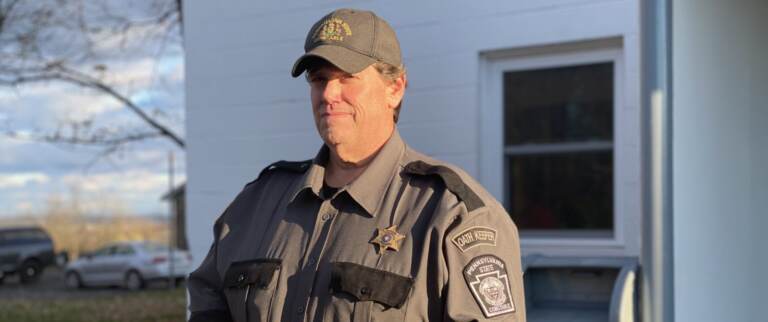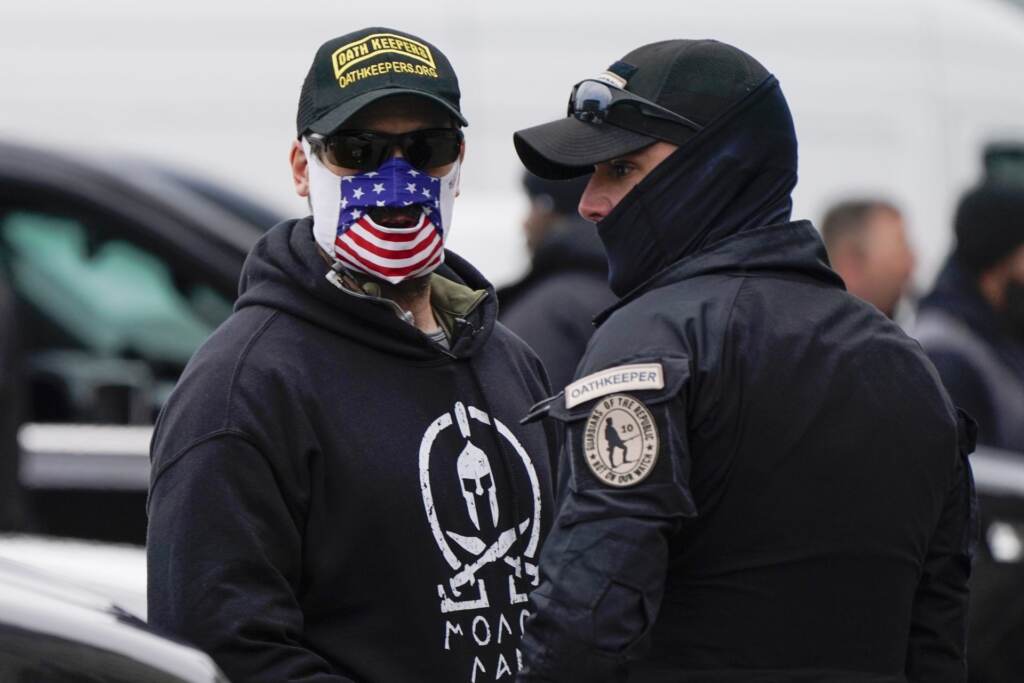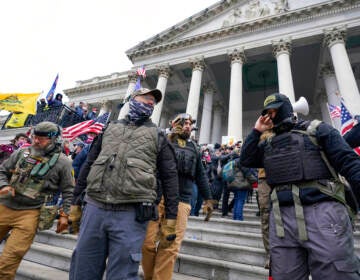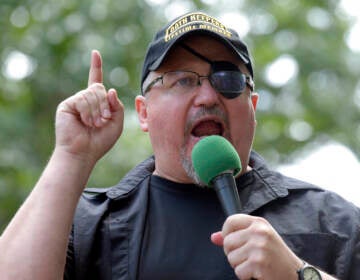Police, constables in Pa. joined ‘anti-government’ Oath Keepers
One constable supports the group, while some police and others say they have since left it.

Pennsylvania State Constable Kevin Noecker in Berks County says the Oath Keepers, whose leadership is alleged to have played a key role in the Jan. 6 U.S. Capitol attack, is misunderstood. Other police and constables in Pa. who once joined the group have since distanced themselves from it. (Brett Sholtis / WITF)
Dozens of police officers and five current state constables in Pennsylvania joined the Oath Keepers over the past decade, according to a WITF analysis of the group’s registration data, public records and interviews with one current and several former members.
The findings shed light on how an organization whose members have interfered with federal law enforcement and showed up armed at protests once appealed to some officers. Several former members who spoke to WITF say they left the group after it took actions they did not support. One constable from eastern Pennsylvania, who is still a member, defends the group.
The Oath Keepers are under heightened scrutiny after the Jan. 6 insurrection in Washington D.C. that disrupted the peaceful transfer of presidential power. More than a dozen members are accused of attacking the U.S. Capitol to try to forcibly keep the losing candidate in power after the Oath Keepers’ leader called on members to “fight” against certification of Joe Biden’s victory.
The memberships raise concerns for some who monitor extremism or voters’ rights at polling places, where constables have authority.
Army veteran Stewart Rhodes formed the Oath Keepers in 2009 with a plan to recruit members from the ranks of police departments, military units and veterans’ groups — and a promise to defend the U.S. Constitution and resist what he called “unlawful orders.”

That promise is what appealed to Middlesex Township Police Officer Joseph Hallisey years ago.
“Back then it seemed like a good idea,” said Hallisey, who serves part of Cumberland County. The idea of veterans and police pledging to keep their oaths to the Constitution sounded honorable.
Hallisey said a local chapter of the group was interested in things such as emergency preparedness and civic engagement. However, the national group’s leadership soon “started going off the rails,” and he decided not to renew his membership.
Washington County Sheriff’s Office Sergeant Robert Lonick said he joined the Oath Keepers more than five or six years ago, and he left the group shortly after. Lonick emphasized that he never participated in group activities.
East Lansdowne Police Officer James Cadden said when he entered his information on the group’s website years ago, he thought it was dedicated to fighting corruption within police ranks.
The three-decade veteran of the agency that serves part of Delaware County said he remembers seeing the Oath Keepers mentioned on law enforcement websites, giving him the sense that they were a trusted organization.
After he heard about some Oath Keepers participating in a coalition of militia groups near the Malheur National Wildlife Refuge in Oregon in 2016, preventing federal authorities from reaching the armed militants who occupied the federal land, he decided the group wasn’t for him.
These officers are among nearly 1,500 people with Pennsylvania addresses listed in the Oath Keepers data. WITF obtained the information from Distributed Denial of Secrets, a group that offers leaked or hacked material to journalists and researchers. The data did not indicate how recently a person was an active member.
Public profiles associated with those names show professions ranging from construction workers and small business owners to medical doctors, lawyers, and commercial airline pilots. A few appear to be current or former military officers. Others draw county or state paychecks. Several hold local elected office.
The hacked data has led police departments around the country to look into officer affiliations with the group. In Pennsylvania, Pittsburgh police Lieutenant Philip Mercurio is under internal review after USA Today reported that he appeared to have used his police email address to join the group. When a WITF reporter called him to talk, he hung up.
Two departments contacted for this story said they have policies preventing officers from joining groups that aim to interfere with or overthrow a “lawfully constituted government” — similar to this Pennsylvania State Police policy. No state troopers were identified as having joined the Oath Keepers.
In addition to those mentioned, WITF identified four more people whose Oath Keepers information matches that of current police officers in Pennsylvania. Journalists matched names, addresses and contact information with those found in public records, which in some cases showed places of employment. WITF is not publishing those names or agencies because it couldn’t conclusively determine that the information was correct.
WITF also found 47 people whose social media profiles or other public records state they are former police officers, or whose self-identification as police is reflected in the Oath Keepers data cache, but who didn’t appear to be currently working for departments.
An ‘anti-government’ group
Groups such as the Anti-Defamation League describe the Oath Keepers as “right-wing, anti-government extremists who are part of the militia movement, which believes that the federal government has been co-opted by a shadowy conspiracy that is trying to strip American citizens of their rights.”
The Southern Poverty Law Center points to Oath Keepers founder Stewart Rhodes’ incendiary public comments and messages to members. Those include an open letter posted in December 2020, as allies of the former president were ramping up lies that the election had been stolen. In that post, Rhodes called on former president Donald Trump to declare martial law or risk militia-led civil war.
Rhodes also called for members to attend the Jan. 6 rally that led to the U.S. Capitol attack.
“It is CRITICAL that all patriots who can be in D.C. get to D.C. to stand tall in support of President Trump’s fight to defeat the enemies foreign and domestic who are attempting a coup, through the massive voter fraud and related attacks on our Republic,” Rhodes said on the Oath Keepers’ website on Jan. 4, according to criminal filings against alleged Jan. 6 conspirators.
A vast amount of reporting and research have shown there was no widespread voter fraud in 2020. Of the Oath Keeper members accused in connection with the U.S. Capitol attack, some are facing conspiracy charges, NPR reports.
Oath Keepers affiliation can pose specific problems when members are police officers or constables, according to experts at the Center for Strategic and International Studies and the Center for International Security and Cooperation’s Mapping Militants project.

One problem is that the Oath Keepers want to decide for themselves what is or isn’t constitutional — and use intimidation or force to get their way, according to Catrina Doxcee, at the Center for Strategic and International Studies’ Transnational Threats Project. This is at odds with law enforcement officers’ duty to the public.
“We see the Oath Keepers and other similar groups really wanting to take the law into their own hands to define for themselves how the Constitution should be applied, what is seen as lawful and what is not — including rejecting government efforts that they disagree with,” Doxcee said.
She pointed to one example: In 2015, members arrived with assault rifles, bulletproof vests and camouflage gear at protests in Ferguson, Missouri, against the wishes of the Ferguson police chief, while the city was under a state of emergency.
Doxcee said officers’ involvement in the Oath Keepers can worsen police relationships with Black and Latino communities that are often already strained.
Trust between a community and police can be eroded when people feel that police will treat them differently due to an officer’s potential extremist ties, said Mapping Militants’ Iris Malone, an assistant professor at George Washington University.
“It feeds into this narrative that they cannot or will not be able to protect you — and the risk there is counter mobilization of loss and trust of institutions,” Malone said.
Constables, Oath Keepers and polling places
Malone and Doxcee see similar issues when state constables are part of extremist groups. Using public records and interviews, WITF identified five people elected as constables who once joined the group.
Pennsylvania State Constable Kevin Noecker says people often misunderstand what the Oath Keepers are about. Noecker is an active member who wears an “Oath Keeper” patch on his uniform and has attended meetings in Berks County where he serves.
He joined the group in 2010 after hearing Stewart Rhodes on the late-night talk radio show Coast to Coast AM. Back then, Noecker was considering whether to run for constable, and Rhodes’ message helped inspire him to run.
Noecker pointed to gun confiscation and “rounding up people” as things he’d refuse to do. Such events may be unlikely, but it’s better to be prepared, he said.
The events of Jan. 6 were “a real big major screw-up on everybody’s part” — he includes the federal government in that assessment — and he said the Oath Keepers have been taking a beating in the news since then.
The newly-reelected third-term constable said he never traveled out of state to support Oath Keepers causes, but has worn the group’s logo at events such as the annual 2nd Amendment rally at the state capitol.
“If there was a reason that something would have to be protected here, and it would be for the people and constitutionally correct, yes, I would definitely stand my ground as a constable and an Oath Keeper and protect my family and my people in my area,” Noecker said.
Pennsylvania constables are elected locally to serve courts but are technically employees of the state. Their annual compensation can range from a few thousand dollars a year to over six figures, based on how frequently the courts where they work use their services.
Constables transport prisoners and serve warrants and eviction notices. They are required to be at designated polling places during elections to maintain order, according to state law.
Constable Craig Westover in Venango County, who also serves on the Pennsylvania Commission on Crime and Delinquency Constables Education and Training Board, said he joined the group in 2014 after a local chapter popped up with a dozen or so members.
Westover said he registered with the group and started attending meetings as a way to make sure the group wasn’t doing anything too extreme.
“It can be somewhat politically sensitive when you’re monitoring other people,” Westover said. “But that’s how we monitor, to make sure we don’t have a situation like we did on January 6th.”
After a few months, as local group participation fizzled, Westover stopped attending meetings and ended his membership, he said.
WITF contacted two more constables it linked with data in the Oath Keepers spreadsheet — both serving in an electorally competitive county in eastern Pennsylvania. One said he left the group. Another said he wasn’t in the group. Both threatened to sue if their names were published.
WITF also identified a constable in southeastern Pennsylvania who couldn’t be reached.
Affiliation with a group isn’t necessarily an issue, said David Thornburgh, president of the nonpartisan good-government group Committee of Seventy. But it is worth examining. Constables who violate their oath of office should be held accountable if they broke rules, he said.
“We live in a time when we see conspiracies around every corner,” Thornburgh said. “We have to pay attention to what people do or say, but we also can’t anticipate what they might say or do and throw the force of law at them ahead of time.”
The office of Democratic Gov. Tom Wolf declined to say whether it was contacting the constables to ask about their relationship with the Oath Keepers. It noted that all commonwealth employees, including members of any board or commission, must follow the Governor’s code of conduct.
“Pennsylvania is a commonwealth that is welcoming to all, and the Wolf Administration condemns any involvement in a hate group,” said spokeswoman Beth Rementer in an email.
Julia Agos, Scott Blanchard, Sam Dunklau, Tim Lambert, Gabriela Martinez, Rachel McDevitt and Anthony Orozco contributed to this report.
WHYY is your source for fact-based, in-depth journalism and information. As a nonprofit organization, we rely on financial support from readers like you. Please give today.







